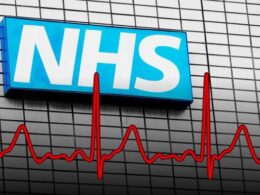institute for health transformation
health and tech strategy
Joaquim Cardoso MSc
Founder and Chief Researcher & Editor
February 16, 2023
SOURCE:
Health Essentials
Cleveland Clinic
February 9, 2023
Think you’re too young to worry about heart disease? Think again.
A lower number of birthday candles doesn’t offer immunity from cardiovascular issues. Want proof?
Just look at this research, which shows an alarming increase in heart attacks for people under the age of 40 in the United States.
To understand why this is happening, we turn to preventive cardiologist Luke Laffin, MD.
Lifestyle and heart attack risk
So, can someone in their 20s have a heart attack?
Absolutely — but it wasn’t always as common as it is today.
It used to be pretty unusual for someone younger than 40 to experience the chest-grabbing pain of a heart attack.
“It was rarely seen or discussed as a medical trend,” says Dr. Laffin.
So, what changed?
Basically, the way we live. Much of the rise in heart attacks at a young age can be attributed to lifestyle changes, like:
- More time sitting in front of a computer screen.
- Eating more ultra-processed foods and fast food meals.
- Decreased physical activity (particularly cardio).
“These bad habits are starting in early childhood now,” notes Dr. Laffin.
“There needs to be attention brought to how important prevention and modification is.”
“There needs to be attention brought to how important prevention and modification is.”

Causes of early heart attacks
Risk factors don’t necessarily care about age. Heart attacks aren’t just something for grandmas and grandpas to worry about.
“When we’re talking about people at a young age having heart attacks, it’s important to individualize the discussion,” says Dr. Laffin. “It’s about having an honest conversation and not pushing things off and saying ‘Oh, I’m too young.’”
Your risk of an early heart attack can develop or accelerate through the following:
- 1.Type 2 diabetes
- 2.Tobacco use
- 3.Substance abuse
- 4.Family History
1.Type 2 diabetes
It’s not a coincidence that increased heart attacks among the younger crowd coincide with a spike in Type 2 diabetes. “That’s one of the biggest risk factors for heart disease,” states Dr. Laffin.
Your risk of heart disease actually doubles if you have diabetes — and those ticker troubles can start at a young age, according to the U.S. Centers for Disease Control and Prevention (CDC).
The reason? Elevated blood sugar levels from diabetes can damage blood vessels and nerves serving the heart. That can lead to coronary artery disease, which interrupts the flow of blood to your heart.
People with diabetes also are more likely to have other conditions that can raise heart attack risk, including high blood pressure (hypertension) and obesity.
2.Tobacco use
Cigarette smoke is a haze of more than 7,000 chemicals. Breathing in that toxic mix does all sorts of harm throughout your body — including your heart.
Smoking changes your blood chemistry, which can gunk up your arteries with a waxy plaque buildup. That makes it more difficult for blood to flow like it should and increases your risk of a blockage causing a heart attack or stroke.
Nearly 1 in 5 deaths from cardiovascular disease are connected to cigarette smoking.
3.Substance abuse
Researchers found that younger people who’ve had a heart attack are more likely to report substance abuse, including the use of marijuana and cocaine. (Other risk factors were similar between older and younger populations.)
4.Family history
Genetics can make you more likely to have an early heart attack. Your hereditary risk of heart disease is defined by having a:
- First-degree male relative (like your father, brother or son) under the age of 55 with heart attack or stroke history.
- First-degree female relative (like your mother, sister or daughter) under the age of 65 with heart attack or stroke history.

Heart attack prevention tips
The best way to avoid a heart attack is to prevent the progression of heart attack risk factors before they grow into concerns. The earlier you take action, the better off you’ll be.
That means working to change social and environmental conditions that affect your heart health. These include taking steps to:
- Exercise more
- Maintain a healthy weight
- Eat nutritious foods
- Manage stress and blood pressure
- Learn your family’s heart history.
- Exercise more. Getting 150 minutes of moderate-intensity exercise a week can reduce your risk of heart disease, according to the American Heart Association. Learn how to get started.
- Maintain a healthy weight. Losing just five extra pounds can make a noticeable difference in your blood pressure and cholesterol levels. Target a body mass index (BMI) between 20 and 25.
- Eat nutritious foods. A heart-healthy diet can benefit your body in many ways. Plus, the list of recommended foods is filled with delicious options.
- Manage stress and blood pressure. Learning how to cope with stress will do your heart good. Try these tips to keep your heart happy.
- Quit smoking. Need an incentive to put down those cigarettes? Check out the health benefits you’ll begin to enjoy almost immediately after that final puff.
- Learn your family’s heart history. You can’t change your genetics, but knowledge of them is key to taking the necessary preventative steps to address potential heart issues.
At the end of the day, it’s important to understand the different heart attack risk factors — high blood pressure, waist circumference, unhealthy BMI — and work to correct them, says Dr. Laffin.
“Not enough young people take their risk factors seriously,” he warns.
“But we need to be aggressive about risk factor modification, or the heart attack rate in people at a young age is going to keep climbing.”
“But we need to be aggressive about risk factor modification, or the heart attack rate in people at a young age is going to keep climbing.”
Originally published at https://health.clevelandclinic.org on February 9, 2023.
Names mentioned
- preventive cardiologist Luke Laffin, MD.








